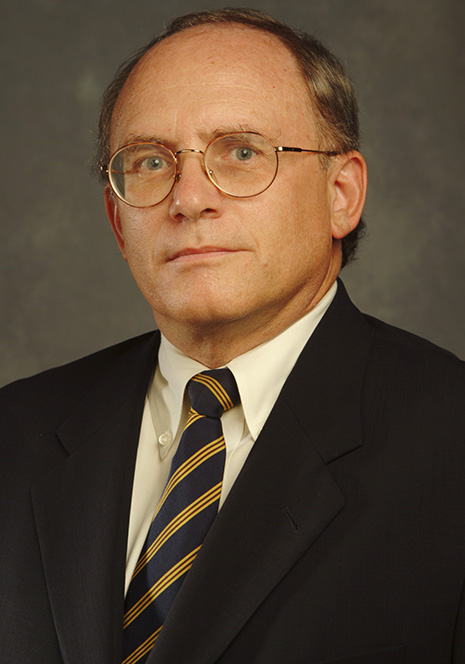FAYETTEVILLE, Ark. – University of Arkansas law professor Mark R. Killenbeck presented “A Prudent Regard for Our Own Good? James Madison and the Commerce Clause, in Nation and State” at the United States Supreme Court in the Court Chamber. His lecture was part of the 2012 Leon Silverman Lecture Series, presented by the Supreme Court Historical Society. The lecture was followed by a reception in his honor in the Supreme Court’s East and West Conference Rooms.
Killenbeck, the Wylie H. Davis Distinguished Professor of Law, was introduced by Associate Supreme Court Justice Sonia Sotomayor. His lecture also was attended by Associate Justice Ruth Bader Ginsburg. The subject of Killenbeck’s lecture, the Commerce Clause, has been at the center of national debate about the constitutionality of the Affordable Care Act since it was signed into law on March 23, 2010. In his lecture, which will be printed in a forthcoming edition of the Journal of Supreme Court History, Killenbeck discussed the nature and history of the Clause, with a strong emphasis on how it was viewed and applied by the founding generation.
“The Supreme Court Historical Society’s invitation to professor Killenbeck speaks to his impeccable reputation as a constitutional law scholar,” said Stacy L. Leeds, dean of the School of Law. “His scholarship, which speaks to the most pressing issues of our time, raises the profile of the School of Law and solidifies his place at the top of his field.”
“I was present at professor Killenbeck’s lecture at the Supreme Court, and it was a tour de force,” said Philip S. Anderson, a former president of the American Bar Association who practices law in Little Rock. Anderson, a 1959 graduate of the School of Law and a former editor-in-chief of the Arkansas Law Review, also said that Killenbeck firmly placed the Commerce Clause in its historical context, as Justice Ginsburg did in her partial dissent in National Federation of Independent Business v. Sebelius, the Supreme Court’s landmark opinion upholding the constitutionality of the Affordable Care Act, which was issued June 28, five weeks after the lecture. “Mark Killenbeck is one of the foremost scholars in constitutional law today,” Anderson said, “and we are fortunate to have him on the faculty of our law school.”
A faculty member at the School of Law since 1988, Killenbeck teaches Constitutional Law, the First Amendment, and American Legal History. He is the author of numerous books, chapters, articles and papers, with a special focus on federalism, American Constitutional history, and affirmative action and diversity. His articles have appeared in a number of major national law journals, including the Supreme Court Review, California Law Review, Michigan Law Review, Vanderbilt Law Review and Hastings Law Journal.
Killenbeck’s most recent book, M’Culloch v. Maryland: Securing a Nation, was published in 2006 by the University Press of Kansas. His assessment of the Supreme Court’s 2003 affirmative action decisions – Affirmative Action and Diversity: The Beginning of the End? Or the End of the Beginning? – was published in 2004 by the Educational Testing Service in their Policy Information Perspective series. He has also contributed chapters to a number of works, the most recent of which is “Affirmative Action and the Courts: From Plessy to Brown to Grutter, and Back?,” which appeared in Social Consciousness in Legal Decision Making: Psychological Perspectives.
Killenbeck is an elected member of the American Law Institute and was the first individual in the history of the School of Law to be elected to membership while serving on the faculty.
Contacts
Andy Albertson, director of communications
Research and Economic Development
479-575-6111,
aalbert@uark.edu
